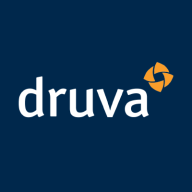

Find out in this report how the two Disaster Recovery as a Service solutions compare in terms of features, pricing, service and support, easy of deployment, and ROI.
| Product | Market Share (%) |
|---|---|
| Commvault Cloud | 10.1% |
| Druva Data Security Cloud | 0.5% |
| Other | 89.4% |

| Company Size | Count |
|---|---|
| Small Business | 57 |
| Midsize Enterprise | 24 |
| Large Enterprise | 81 |
Commvault Cloud is the ultimate cyber resilience platform built to meet the demands of the hybrid
enterprise. Beyond its core functionality of data backup and recovery across diverse workloads, including applications, databases, virtual machines, and files, Commvault Cloud stands out as a robust defense against ransomware. Going beyond backup, the platform integrates advanced data security features such as encryption, access control, and threat detection, safeguarding against unauthorized access and cyber threats.
With tools for data management, classification, and migration, businesses can optimize storage costs, enhance accessibility, and comply with regulations seamlessly. Boasting cloud integration with major providers like AWS, Azure, and Google Cloud, Commvault Cloud leverages the scalability and flexibility of the cloud for comprehensive data protection and management. The platform's automation capabilities streamline tasks, and its reporting and analytics features provide valuable insights into data usage, potential risks, and optimization strategies. Commvault Cloud is not just a security tool; it is a key component of cyber resilience, enabling organizations to not only protect against cyberattacks but also recover swiftly and minimize the impact of incidents. Elevate your cyber resilience strategy with Commvault Cloud.
Druva Data Security Cloud is a cloud-based platform offering comprehensive data security and management for businesses. It provides features focused on data backup, recovery, archiving, and governance across cloud workloads (like Microsoft 365, Google Workspace, and Salesforce), endpoints (such as laptops and mobile devices), and virtual machines (VMs). Key functionalities include centralized management via a web-based console, automated backups and quick recovery, data archiving for compliance, threat protection with malware and ransomware detection, and data loss prevention (DLP). The platform is scalable and flexible, allowing customization to meet specific data volume and security needs.
We monitor all Disaster Recovery as a Service reviews to prevent fraudulent reviews and keep review quality high. We do not post reviews by company employees or direct competitors. We validate each review for authenticity via cross-reference with LinkedIn, and personal follow-up with the reviewer when necessary.